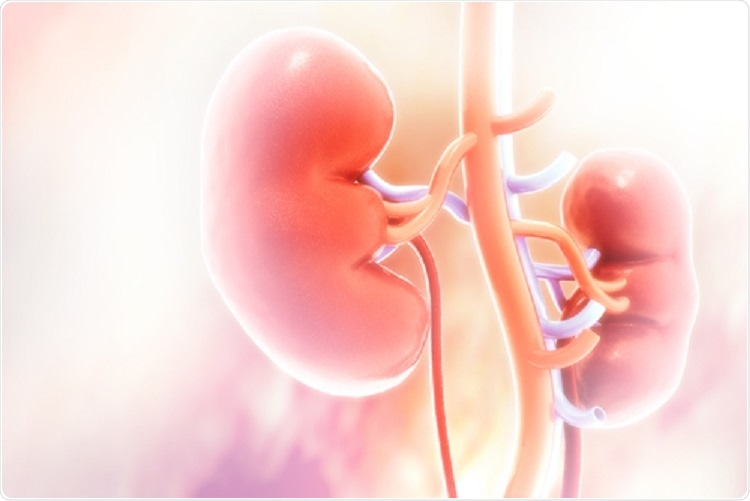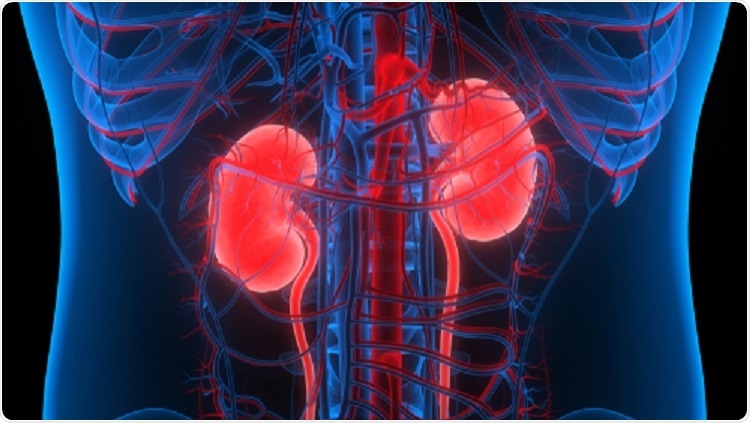An interview with Dr Natarajan Ranganathan, key founder and Managing Director of Kibow Biotech Inc. about the use of probiotics for supporting healthy kidney function.
What is the relationship between probiotic microorganisms in the gut and overall kidney health?
That is a good question. The “gut” plays an essential role for maintaining good health at all times. If there is a disturbance in the gut, this cause the increased growth of more pathogenic (i.e., “bad”) bacteria over “good” bacteria, which results in generation of uremic toxins. Using probiotics (“good bacteria”) for removal of uremic toxins from the colon could help to maintain healthy kidney function.

Image credits: crystal light/shutterstock.com
How are probiotics defined?
Probiotics are defined as microbes that, when ingested in sufficient quantity, have health benefits. While 1 million or 5 million CFUs (Colony Forming Units) may sound like a good amount, actually there needs to be billions of CFUs present in the gut. This is because the gut microbiota (the total microbial count in the bowel) is almost 100 trillion, so to have a beneficial effect a probiotic needs to contain billions. 1
What are uremic toxins?
There are around a hundred types of uremic toxins. The ones of major concern for those with kidney health issues are urea, uric acid and creatinine. There are several others called middle molecules, which are present in very small concentrations. Middle molecules are molecules which have a size of between 500 - 30,000 daltons. They are presumed to be an endogenous poison in patients with chronic kidney disease, and one of the goals of hemodialysis is to remove these. 2
Many of the middle molecules have been linked either indirectly or directly with cardiovascular disease and improving the removal of these types of uremic solutes is a goal for improving kidney dialysis technology. 3

Image credits: Tartila/shutterstock.com
What is Enteric Dialysis® technology – how does it remove these harmful toxins from the body?
Renadyl -How it works
Enteric toxin reduction technology is an innovative and non-invasive approach to maintaining healthy kidney function. It is a patented process that utilizes probiotics, carefully selected bacteria, to metabolize circulating uremic toxins when they diffuse out of the blood and into the colon. The probiotic organisms (i.e., “beneficial bacteria”) in the colon act like blood cleansing agents, which, with the aid of microbes, indirectly remove toxins and helps eliminate them as waste (i.e., fecal matter).
What is Renadyl™ and how is it formulated? What sets it apart from others in the market?
The Microbial strains present in Renadyl™4 have a very high capacity to utilize various uremic toxins in comparison to any other probiotic strains in the market5.
Our product has been shown in clinical trials to remove small molecules as well as middle molecules 6.
Step-by-step look at how Renadyl™ helps the body excrete the harmful toxins
- When the kidney becomes impaired or damaged from disease, uremic toxins build up in the blood. Large numbers of these toxins make it into the large intestine (i.e., colon) because of the extensive network of blood vessels that surround it.
- Once Renadyl™ enters the GI tract, probiotic microbes are released from its gastric acid-resistant capsule and enter the large intestine.
- Once in the colon, the microbes target and metabolize the uremic nitrogenous wastes as nutrients for probiotic growth.
- As they metabolize the uremic toxins, the microbes begin to multiply and this, in turn, allows for even greater diffusion of toxins from the blood supply into the bowel.
- Eventually, the metabolized toxins are carried down through the bowel and out of the body as solid waste, sparing the compromised kidneys of the burden.
What effect does Renadyl™ have on kidney health?
Renadyl™ removes several uremic toxins that accumulate in the blood as a result of kidney failure. In healthy kidneys, most uremic toxins are removed by urination and some in the feces. What happens with Renadyl™ is that you reduce levels of uremic toxins and suppress the pathogenic bacteria. This then results in improved quality of life (QoL) with normal gut flora. 7

Image credits: Magic mine/shutterstock.com
What is the potential of Renadyl™ for those with Chronic Kidney Disease?
For those who are in Stage III and IV Chronic Kidney Disease (CKD), also called pre-dialysis patients, Renadyl™ may stabilize kidney function, as measured by Glomerular Filtration Rate (GFR) 8 and thereby possibly delaying the need for traditional dialysis, although this is dependent on other health factors and may vary person to person 9 10. For Hemodialysis patients, Renadyl™ may have the potential to improve quality of life (QoL) by alleviating the “yo-yo” effect (up and down) with better outcome 11.
Read Kibow Biotech's recent press release here.
What are the limitations in terms of healthcare and disease treatment claims that can be made about Renadyl? How is Kibow Biotech working to overcome these?
As it is currently, with Renadyl as a dietary supplement, Kibow cannot make any disease claims, use words like treatment, cure, prevent, delay, etc., as per the US FDA and FTC rules. We cannot represent our product as a drug to any customer. However, with the three human clinical trials we have done with Chronic Kidney Disease patients stage III and IV patients and those undergoing dialysis we can share the outcome experienced by the customers. What is the customer experience that we have? The GFR has not declined, it is stable. We can make “structure-function” claim such as “…helps maintain healthy kidney function,” because of the clinical data and customer feedback that we have.
For more information about clinical trials and studies conducted with Renadyl™ check out Kibow Biotech, this includess all Kibow abstracts published since 2001. All of Kibow peer-reviewed journal articles since 2005 are also available.
About Natarajan Ranganathan, Ph.D.
 Dr. Natarajan Ranganathan (Dr. Rangan) is the key founder and Managing Director (R&D) of Kibow Biotech Inc. located in Newtown Square, PA - USA, which specializes in the clinical utility of probiotics towards Chronic Kidney Disease and related applications.
Dr. Natarajan Ranganathan (Dr. Rangan) is the key founder and Managing Director (R&D) of Kibow Biotech Inc. located in Newtown Square, PA - USA, which specializes in the clinical utility of probiotics towards Chronic Kidney Disease and related applications.
Dr.Rangan completed dual master's degrees in organic chemistry and biochemistry, a doctoral degree in Bio-organic chemistry and further academic training and postdoctoral work in reproductive, radiation and nuclear medicine. In the last two decades he has been a pioneer in understanding the field of Gut Microbiome, Dysbiosis, and its stabilization with Probiotics and prebiotics towards health, disease and healing processes.
For more information about Dr. Rangan's academic and career history and his leadership of Kibow Biotech Inc., you can read his full biography.
Disclaimer: This article has not been subjected to peer review and is presented as the personal views of a qualified expert in the subject in accordance with the general terms and condition of use of the News-Medical.Net website.